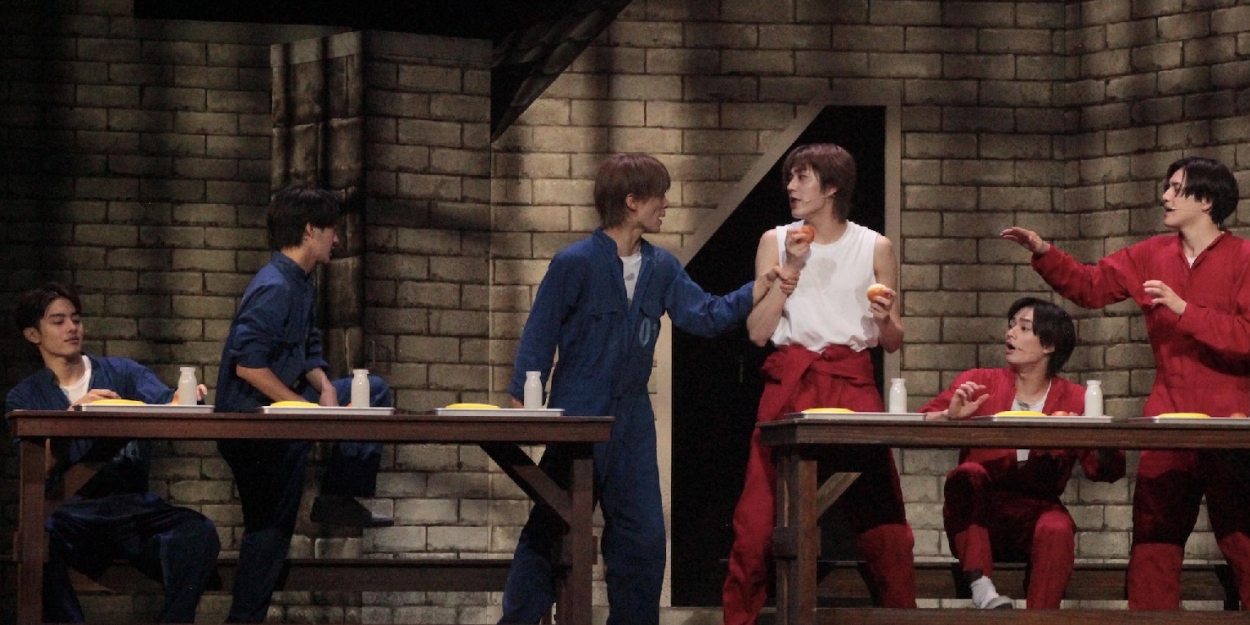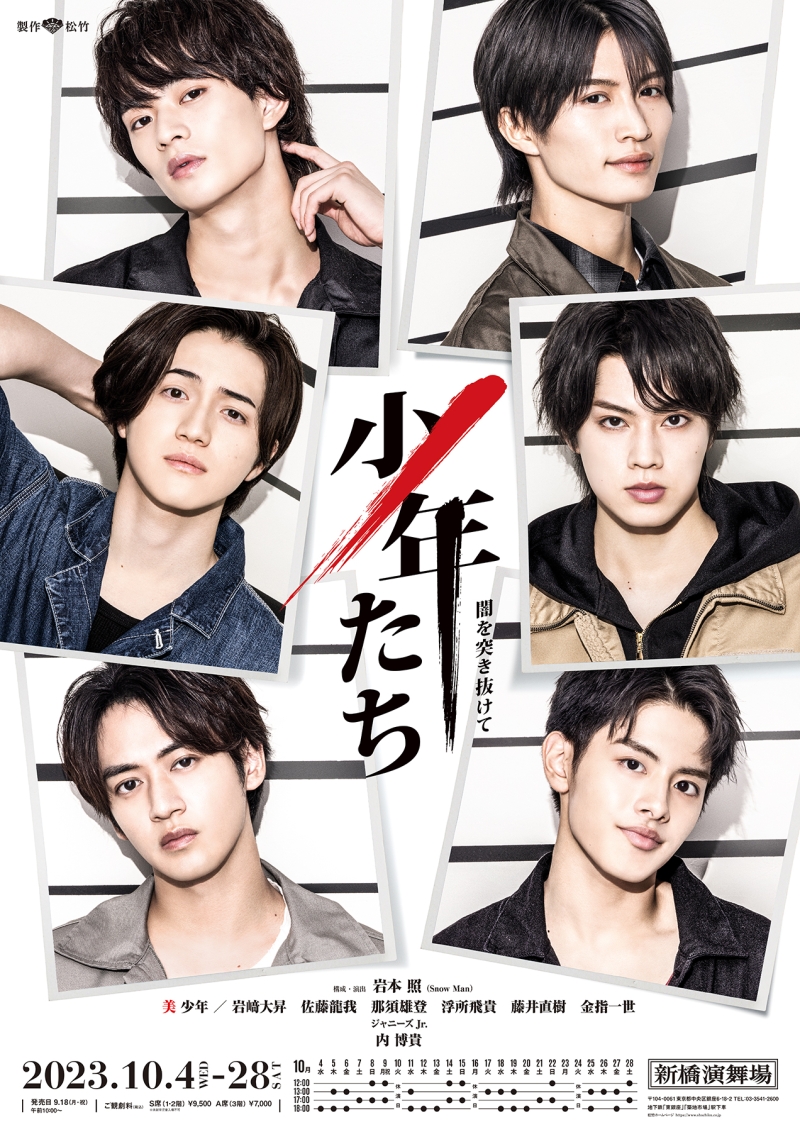Review: SHONENTACHI 2023: THROUGH THE DARKNESS at Shinbashi Enbujo
A masterpiece I hope will continue to present in our future in Japan

Stage play “Shonentachi”: Since its debut in 1969, "Shonentachi" has evolved and continued as a series. Kis-My-Ft2, A.B.C-Z, Johnny's WEST, SixTONES, Snow Man, and other Johnnys' Jr. talents have also appeared before their CD debut. It's considered a stepping stone for young talents, and in 2019, it was adapted into its first movie. This year, Bishonen (Click here to see Interview: Bishonen)takes their solo lead, Hiroki Uchi also appears, and Hikaru Iwamoto (Snow Man) (Click here to see Interview: Hikaru Iwamoto) takes on the role of director, choreographer, and stage composition alone for his first time. It's a refreshing stage that portrays the conflicts of these boys, along with the friendships that lies ahead.
In the year 20XX, Japan was torn apart by war, and young boys who committed crimes in their desperate quest for survival found themselves incarcerated in prison. Divided into red and blue factions, they consider each other as rivals and often engaged in fierce brawls. However, they soon realized they were under the brutal control of the prison warden (Hiroki Uchi), and escape became their only hope.

(From the top right)Nasu, Sato, Kanasashi
Before the show starts, people on stage were moving about, engaging in casual conversations, watering plants, and portraying a peaceful daily life. However, once the play began, the stage transformed with intense dance sequences, depicting a society engulfed in war. The boys have incarcerated one by one. Nasu (Yuto Nasu), Kanasashi (Issei Kanasashi), and Fujii (Naoki Fujii) who belong to the blue faction, and Ryuga (Ryuga Sato) and Ukisho (Hidaka Ukisho) who belong to the red. Although those in the blue and the red fight against each other, Iwasaki (Taisho Iwasaki) who belongs to the red rejects the conflicts. He was regressing and bring like a child due to his memory loss he is suffering from. Their a cappella harmonies during the chorus of "Oretachi wa Joto (俺たちは上等)“ performed by all six were beautiful. The red and blue lighting scattered throughout the stage symbolized the rivalry between the two factions.
In a scene where Nasu and Ukisho, once close friends, struggled each other with their true feelings, their intense performance captivated the audience and drew them further into the story. The impactful use of their larger-than-life shadows on the backdrop left a lasting impression. On the contrary, the segment involving a penalty game with a big jump rope challenge filled the entire venue with smiles. It was providing a delightful moment with a great contrast.
When Kanasashi, ordered by the prison warden, attempts to shoot Nasu is filled with tension. When Kanasashi is revealed that he was a former child soldier and he tried to take his own life, his trembling voice and shaking shoulders embody the weight of his sorrow. Ryuga's words to Kanasashi, "Don't act like a baby," touched audiences’ hearts deeply.
Hiroki's overwhelming presence shines as he showers the young boys with shouts and violence, dominating them as the warden. Fujii's heartfelt plea, "Don't you understand how we feel!?" while shedding tears strikes a chord with the crowd. Each of the six boys driven by their dreams decide to escape from the prison, express their inner strength by acrobatics and vigorous dance through the song "Through The Darkness (闇を突き抜けて).” The transition from the previously striking red and blue lighting to purple indicates the coming together of the two opposing factions.
The second act begins with the prison wardens' march, accompanied by music and the choreography reminiscent of Michael Jackson's "They Don't Care About Us." As the boys escape from their cells and run, the anxieties and fears were overwhelmed from each one of them. Iwasaki's gestures of insecureness and confusion reveal his childlike innocence. There's also an intense fight scene on the staircase that keeps the audience on the edge of their seats. The prison warden appears on the second floor seat from out of no where and shot Iwasaki who decided to become a decoy. He fell from 3-meter wall onto his back. It was a genuine stunt. Later, as the prison warden was led away, his eyes, hidden beneath his hat, filled with tears, remain etched in memory.
Several years later, the five surviving boys reunited at the site of the former prison, along with the phantom of Iwasaki. Bright smiles made it seem like a happy ending is in sight. However, the outbreak of group reading began suddenly, and filled with an enduring sadness of war. Iwasaki, who had always been gentle, unexpectedly cuts down a sunflower, connecting it to the red part in the logo and scene, delivering a poignant ending that emphasizes the deep scars of war.
Bishonen’s acting skills, singing prowess, stunt and dance abilities, and the post-showtime performance were truly remarkable. It's astonishing how these young talents have developed such skills over time. It’s worth to look forward to the continued success of Bishonen in their future. Additionally, the director, Hikaru, brilliantly brought out and seamlessly enchanted their individual personalities. Despite each of the six having distinct roles and highlights, the story's core remains well.
"SHONENTACHI 2023: Through The Darkness" not only delivers a powerful message but also holds significant meaning in that it is created by young people and appeals to a younger audience. There are plenty of highlights, making it a production worth revisiting multiple times. This is a masterpiece I hope will continue to present in our future in Japan.
Photo Credit: [© SHOCHIKU Co., Ltd. All Rights Reserved]
Reader Reviews

Videos

